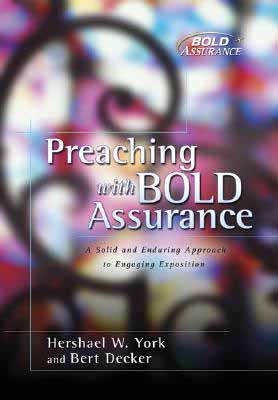
LOUISVILLE, Ky. (BP)–Effective preaching must move beyond mere explanation of biblical facts and teach listeners how to apply God’s truths to their lives, according to a new book.
In “Preaching with Bold Assurance,” released by Broadman & Holman Publishers, Hershael York, Lester Professor of Christian Preaching at Southern Baptist Theological Seminary, and Bert Decker, chairman and founder of Decker Communications, Inc., describe the most successful preaching as placing a dual emphasis on exposition and communication in order to conform listeners to the will of God.
“If you get noting else from this book, understand this: sermons are not about just imparting information. They should be custom-built to change lives. We don’t want to fill their heads; we want the proclamation of the Word to grip their souls and motivate them to conform to the will of God. Our approach to the Bible and to preaching, therefore, has application as its ultimate goal,” the authors write.
“Our prayer is that preachers will never choose between being either biblical or effective but learn that they can and must be both.”
To compose effective sermons, York and Decker believe preachers must focus on three key elements of preaching: the text, the sermon and the delivery.
First and foremost, they note that effective preaching demands an expository approach.
“Expository preaching is defined not by a style nor by a particular methodology, but by the end result of explaining and applying the meaning of the text,” they write. “Expository preaching is any kind of preaching that shows people the meaning of a biblical text and leads them to apply it to their lives.”
Unfortunately, however, York and Decker contend that true expository preaching has become a rarity in American churches.
“While many preachers will stand in a pulpit this Sunday, few who would call themselves expositors will. Fewer still will be the number of preachers who actually are expositional in their preaching.”
Yet expository preaching “is what God uses to change lives more than any other kind [of preaching], because a person cannot preach expository messages unless he is saturated with the Word of God. And the more our sermons are dependent on the inspired text, the more inherent power they will have,” York and Decker write.
For a sermon to be truly dependent on the Bible, according to the authors, the preacher must study the context, the content and the application of his text. They point to such activities as outlining and diagramming passages as effective methods of engaging a biblical text.
Secondly, York and Decker see effective preaching as requiring skill in the act of sermon crafting.
“The sermon is the bridge we build between the text and the congregation,” they write. “With Bible-based truth and listener-based delivery, the sermon carries God’s Word to man’s ears and on to his heart. So it is essential that we be committed both to biblical truth and also to culturally relevant styles of communication.”
The book guides preachers in the technical aspects of building a relevant sermon, discussing such topics as sermon outlining, illustrating a point, introducing a sermon and concluding a sermon.
Thirdly, according to York and Decker, effective preaching requires skillful sermon delivery.
“What is the most important thing in communicating?” the authors ask. “Is it content or delivery? Simply put — it’s both. You cannot effectively have one without the other. Just as you have spent years of study and preparation in learning how to handle the text, so must you learn how to handle the tools of delivering the message so that the message reaches your intended listeners.”
Most important to effective sermon delivery, according to York and Decker, is establishing trust with the congregation. To establish trust, a preacher must utilize both verbal and visual communication.
They caution, however, that preachers should not view their task as one of selling the Gospel.
“We are not at all suggesting that people accept the Gospel based on the sophistication of our presentation. What we are suggesting is that they will not even hear the Gospel if they do not find us credible. They must have an emotional response to the evangelist before they can ever hear the evangel.”
Ultimately, York and Decker contend that Christian preaching can be the most powerful tool of communication in the world because of its content and power.
“Christian communicators have the potential to become the greatest communicators in the world. If our message is biblical, then it is unquestionably true and has the inherent power of the Holy Spirit that transcends any human message or capacity.”
They conclude by admonishing preachers, “Never forget what a privilege God has given you. You speak for God! You are an ambassador of heaven, a bearer of the best news that people could ever hear. That responsibility demands and deserves your best.”
Broadman & Holman is the trade publishing arm of LifeWay Christian Resources of the Southern Baptist Convention.
–30–
(BP) photo posted in the BP Photo Library at http://www.bpnews.net. Photo title: PREACHING WITH BOLD ASSURANCE.
















